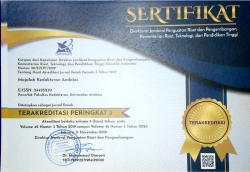Nutrition Care in Cancer Patients
Abstract
Objectives: to provide information about nutritional problems in cancer patients. Method: writing this article using the literature searching method. The sources used are articles, books and the WHO website to collect epidemiological data. Articles and books are taken in Indonesian and English. Search the source of the article using the help of Google Scholar and Google search engines. Results: about 25-70% of patients with cancer are malnourished, this is related to changes in metabolism. Changes in carbohydrate metabolism such as an increase in lactate metabolism 10-100 times faster. Changes in protein metabolism such as protein degradation in muscle. Changes in fat metabolism such as increased lipolysis by 85%. These metabolic changes must be prevented by providing adequate nutrition for patients with cancer. Malnutrition in patients with this cancer can increase the length of stay and increase mortality. With the provision of adequate nutritional therapy is expected to help accelerate the healing process of patients with cancer. Conclusion: Malnutrition in patients with cancer is a condition that often occurs and can have an impact on increasing patient mortality. Provision of adequate nutritional therapy is expected to reduce the risk of mortality and accelerate the healing of patients with cancer.
Keywords
Full Text:
PDFReferences
World Health Organization. Cancer. 03 March 2021. available from: https://www.who.int/news-room/fact-sheets/detail/cancer
Kementerian Kesehatan Republik Indonesia. Hasil Utama RISKESDAS 2018
Sutandyo N. Terapi Nutrisi Pada Pasien Kanker. In: Setiati S, Alwi I, Sudoyo AW, Simadibrata MK, Setiyohadi B, Syam AF (eds). Buku Ajar Ilmu Penyakit Dalam. 6th ed. Jakarta: Interna Publishing; 2014
Andreoli A, Lorenzo A. De, Cadeddu F, Iacopino L, Grande M. New Trends in Nutritional Status Assessment of Cancer Patients. Eur Rev Med Pharmacol Sci. 2011; 15(5): 469-80.
Muscaritoli M, Lucia S, Farcomeni A, Lorusso V, Saracino V, Barone C, et al. Prevalence of Malnutrition in Patients at First Medical Oncology Visit: the PreMiO Study. Oncotarget. 2017; 8(45): 79884-79896. Doi: 10.18632/oncotarget.20168
Hѐbuterne X, Lemariѐ E, Michallet M, Montreuil CB, Schneider SM, Goldwasser F. Prevalence of Malnutrition and Current Use of Nutrition Support in Patients With Cancer. J Parenter Enteral Nutr. 2014; 38 (2): 196-204. Doi: 10.1177/0148607113502674
National Cancer Institute. Nutrition in Cancer Care (PDQ) – Patient Version. 30 July 2021. Available from: https://www.cancer.gov/about-cancer/treatment/side-effects/appetite-loss/nutrition-pdq
Sun L, Quan XQ, Yu S. An Epidemiological Survey of Cachexia in Advanced Cancer Patients and Analysis on Its Diagnostic and Treatment Status. Nutr Cancer. 2015; 67(7): 1056-62. Doi: 10.1080/01635581.2015.1073753
Nourissat A, Vasson MP, Merrouche Y, Bouteloup C, Goutte M, Mille D, et al. Relationship Between Nutritional Status and Quality of Life in Patients With Cancer. Eur J Cancer. 2008; 44(9): 1238-42. Doi: 10.1016/j.ejca.2008.04.006
Hamilton KK, Grant BL. Medical Nutrition Therapy for Cancer Prevention, Treatment, and Survivorship. In: Mahan LK, Raymond JL (eds). Krause’s Food & The Nutrition Care Process. 14th ed. Philadelphia: Elsevier; 2017
Vazeille C, Jouinot A, Durand JP, Neveux N, Boudou-Rouquette P, Huillard O, et al. Relation Between Hypermetabolism, Cachexia, and Survival in Cancer Patients: a Prospective Study in 390 Cancer Patients Before Initiation of Anticancer Therapy. Am J Clin Nutr. 2017; 105(5): 1139-1147. Doi: 10.3945/ajcn.116.140434
Liberti MV, Locasale JW. The Warburg Effect: How Does it Benefit Cancer Cells?. Trends Biochem Sci. 2016; 41(3): 211-218. Doi: 10.1016/j.tibs.2015.12.001
Mazurak VC, Ebadi M. Evidence and Mechanism of Fat Depletion in Cancer. Nutrients. 2014; 6(11): 5280-5297. Doi: 10.3390/nu6115280
Almatsier S. Prinsip Dasar Ilmu Gizi. Jakarta: Penerbit PT Gramedia Pustaka Utama; 2010
Pressoir M, Desné S, Berchery D, et al. Prevalence, risk factors and clinical implications of malnutrition in French Comprehensive Cancer Centres. Br J Cancer. 2010;102(6):966-971. doi:10.1038/sj.bjc.6605578
National Cancer Institute. Nutrition in Cancer Care (PDQ) – Health Professional Version. 14 July 2021. Available from: https://www.cancer.gov/about-cancer/treatment/side-effects/appetite-loss/nutrition-hp-pdq#cit/section_1.3





















